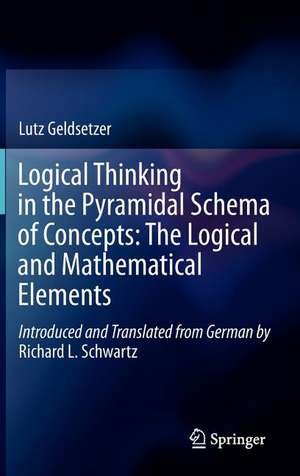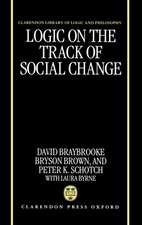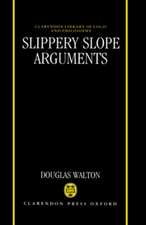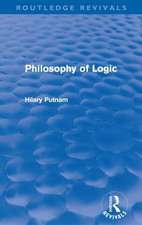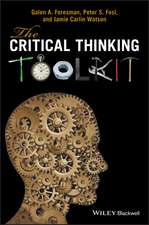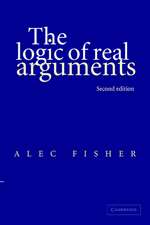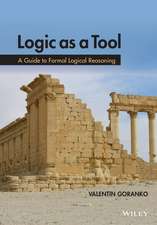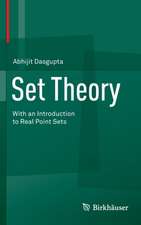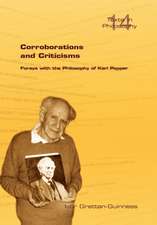Logical Thinking in the Pyramidal Schema of Concepts: The Logical and Mathematical Elements
Autor Lutz Geldsetzer, Richard L. Schwartzen Limba Engleză Hardback – 29 noi 2012
Additionally, the author shows that logical connectors are of fundamentally different types: only one sort generates propositions with truth values, while the other yields conceptual expressions or complex concepts. On this basis, strong arguments are developed against adopting the non-discriminating connector definitions implicit in Wittgensteinian truth-value tables. Special consideration is given to mathematical connectors so as to illuminate the formation of concepts in the natural sciences. To show what the pyramidal method can contribute to science, a pyramid of the number concepts prevalent in mathematics is constructed. The book also counters the logical dogma of ‘false’ contradictory propositions and sheds new light on the logical characteristics of probable propositions, as well as on syllogistic and other inferences.
| Toate formatele și edițiile | Preț | Express |
|---|---|---|
| Paperback (1) | 721.51 lei 6-8 săpt. | |
| SPRINGER NETHERLANDS – 14 dec 2014 | 721.51 lei 6-8 săpt. | |
| Hardback (1) | 727.31 lei 6-8 săpt. | |
| SPRINGER NETHERLANDS – 29 noi 2012 | 727.31 lei 6-8 săpt. |
Preț: 727.31 lei
Preț vechi: 886.97 lei
-18% Nou
Puncte Express: 1091
Preț estimativ în valută:
139.18€ • 148.82$ • 116.04£
139.18€ • 148.82$ • 116.04£
Carte tipărită la comandă
Livrare economică 17 aprilie-01 mai
Preluare comenzi: 021 569.72.76
Specificații
ISBN-13: 9789400753006
ISBN-10: 9400753004
Pagini: 184
Ilustrații: XLIV, 140 p.
Dimensiuni: 155 x 235 x 16 mm
Greutate: 0.44 kg
Ediția:2013
Editura: SPRINGER NETHERLANDS
Colecția Springer
Locul publicării:Dordrecht, Netherlands
ISBN-10: 9400753004
Pagini: 184
Ilustrații: XLIV, 140 p.
Dimensiuni: 155 x 235 x 16 mm
Greutate: 0.44 kg
Ediția:2013
Editura: SPRINGER NETHERLANDS
Colecția Springer
Locul publicării:Dordrecht, Netherlands
Public țintă
ResearchCuprins
Preliminaries.- 1. Concepts.- 2. Logical Connectors (Junctors).- 3. Definitions.- 4. Propositions.- 5. Inferences.- 6. Theories.- 7. Axioms and especially on the genuine Axioms of Logic.
Notă biografică
Prof. Lutz Geldsetzer is Professor Emeritus of Philosophy at the Heinrich-Heine Universitaet in Duesseldorf, Germany, where he has taught since 1963 and where from 1971 to 2002 he directed the research department for general theory of science in the Institute of Philosophy. In 1970, he co-founded the internationally recognized Journal for General Philosophy of Science/Zeitschrift fuer allgemeine Wissenschaftstheorie which he co-edited until 2009. He has published books and articles on a wide range of philosophical topics, and edited several series of philosophical dictionaries, classics in various areas including hermeneutics, and specialized bibliographies. He has been a visiting professor at universities in the United States, the People's Republic of China, Italy, France and Germany. He studied Philosophy, Social Sciences, Law and Languages at the Johannes-Gutenberg Universitaet in Mainz, Germany, where he received his Ph.D. in 1961, and did postgraduate work at the Sorbonne in Paris in 1961-62.
Textul de pe ultima copertă
This new volume on logic follows a recognizable format that deals in turn with the topics of mathematical logic, moving from concepts, via definitions and inferences, to theories and axioms. However, this fresh work offers a key innovation in its ‘pyramidal’ graph system for the logical formalization of all these items. The author has developed this new methodology on the basis of original research, traditional logical instruments such as Porphyrian trees, and modern concepts of classification, in which pyramids are the central organizing concept. The pyramidal schema enables both the content of concepts and the relations between the concept positions in the pyramid to be read off from the graph. Logical connectors are analyzed in terms of the direction in which they connect within the pyramid.
Additionally, the author shows that logical connectors are of fundamentally different types: only one sort generates propositions with truth values, while the other yields conceptual expressions or complex concepts. On this basis, strong arguments are developed against adopting the non-discriminating connector definitions implicit in Wittgensteinian truth-value tables. Special consideration is given to mathematical connectors so as to illuminate the formation of concepts in the natural sciences. To show what the pyramidal method can contribute to science, a pyramid of the number concepts prevalent in mathematics is constructed. The book also counters the logical dogma of ‘false’ contradictory propositions and sheds new light on the logical characteristics of probable propositions, as well as on syllogistic and other inferences.
Additionally, the author shows that logical connectors are of fundamentally different types: only one sort generates propositions with truth values, while the other yields conceptual expressions or complex concepts. On this basis, strong arguments are developed against adopting the non-discriminating connector definitions implicit in Wittgensteinian truth-value tables. Special consideration is given to mathematical connectors so as to illuminate the formation of concepts in the natural sciences. To show what the pyramidal method can contribute to science, a pyramid of the number concepts prevalent in mathematics is constructed. The book also counters the logical dogma of ‘false’ contradictory propositions and sheds new light on the logical characteristics of probable propositions, as well as on syllogistic and other inferences.
Caracteristici
Offers visual representation of all logical elements via pyramidal graph Uses new methodology on the basis of Porphyrian trees as well as on modern concepts of classification Sheds new light on the logical character of contradiction and probable propositions Includes supplementary material: sn.pub/extras
